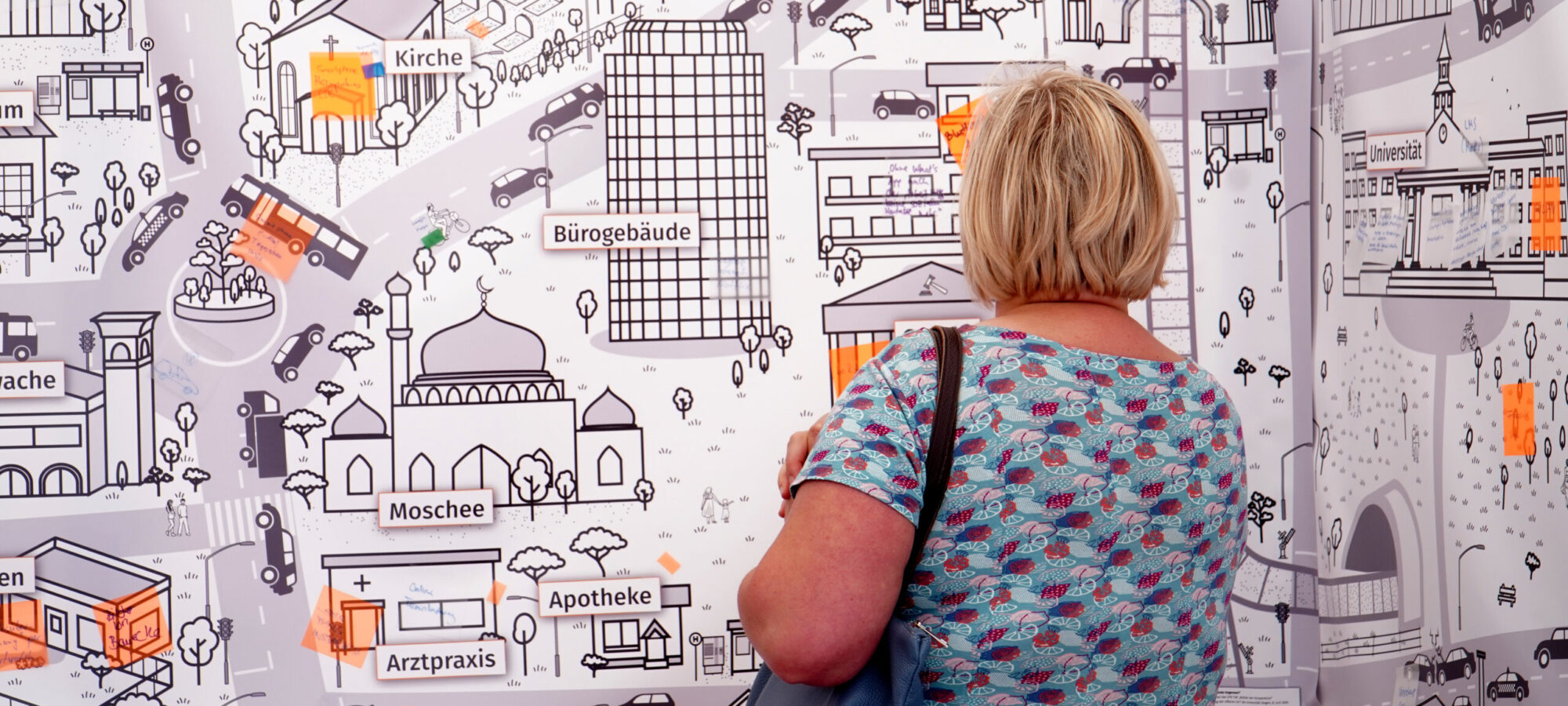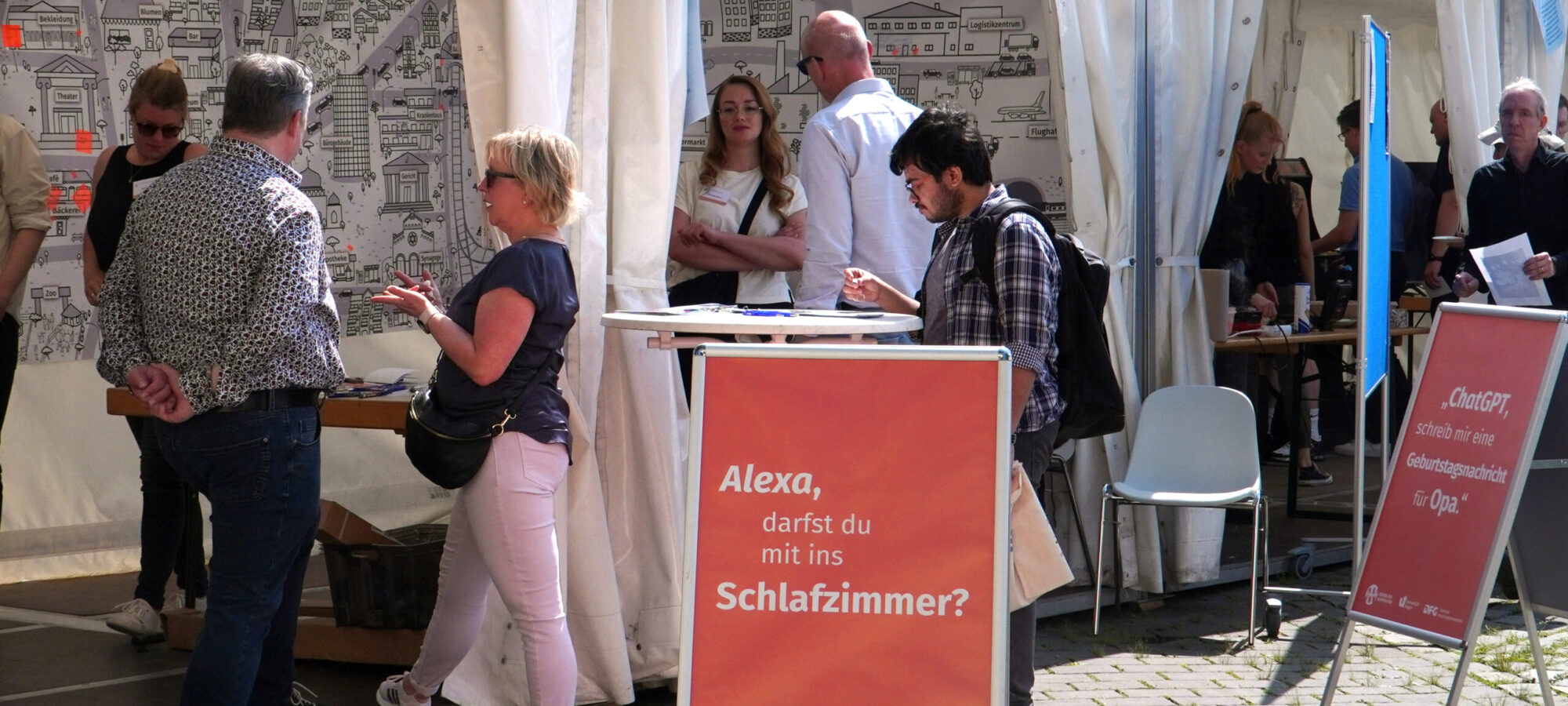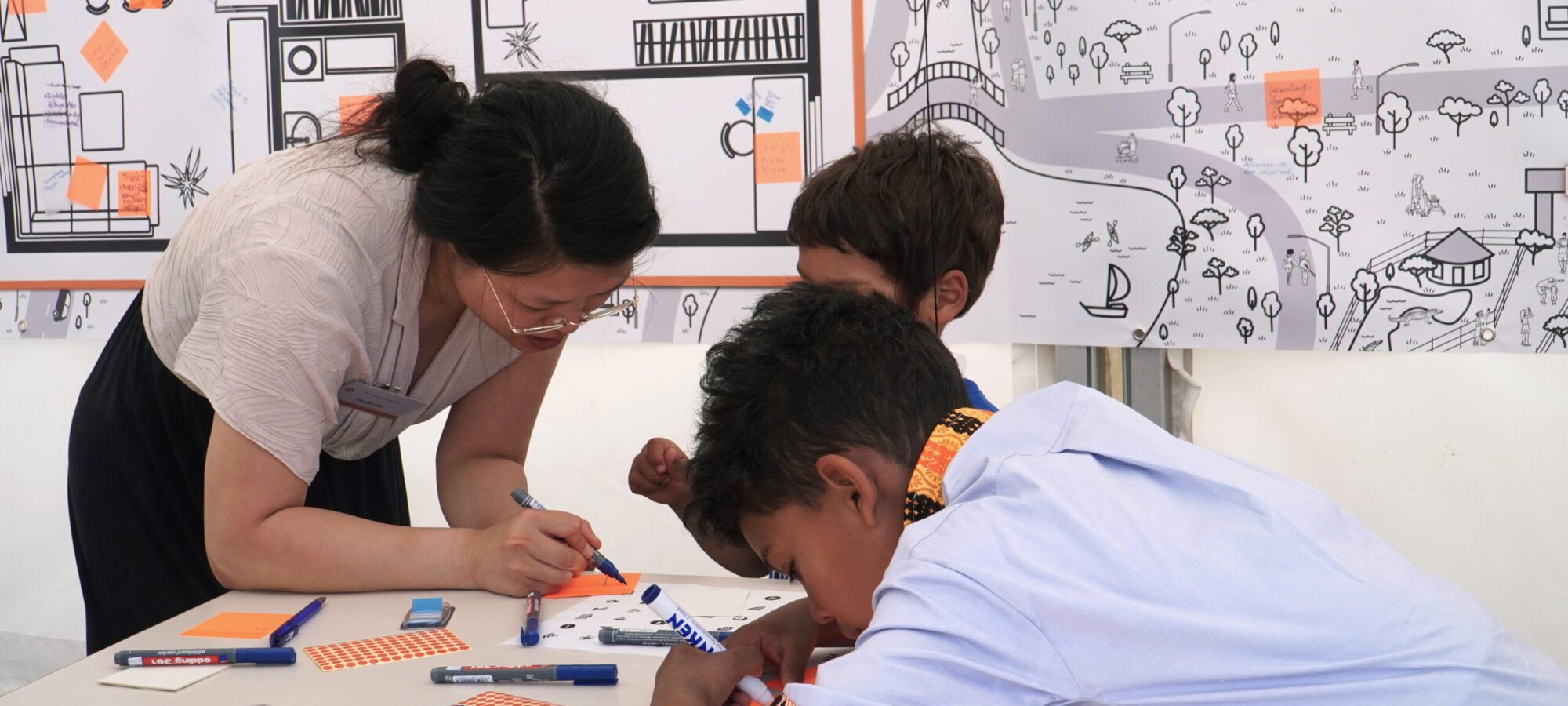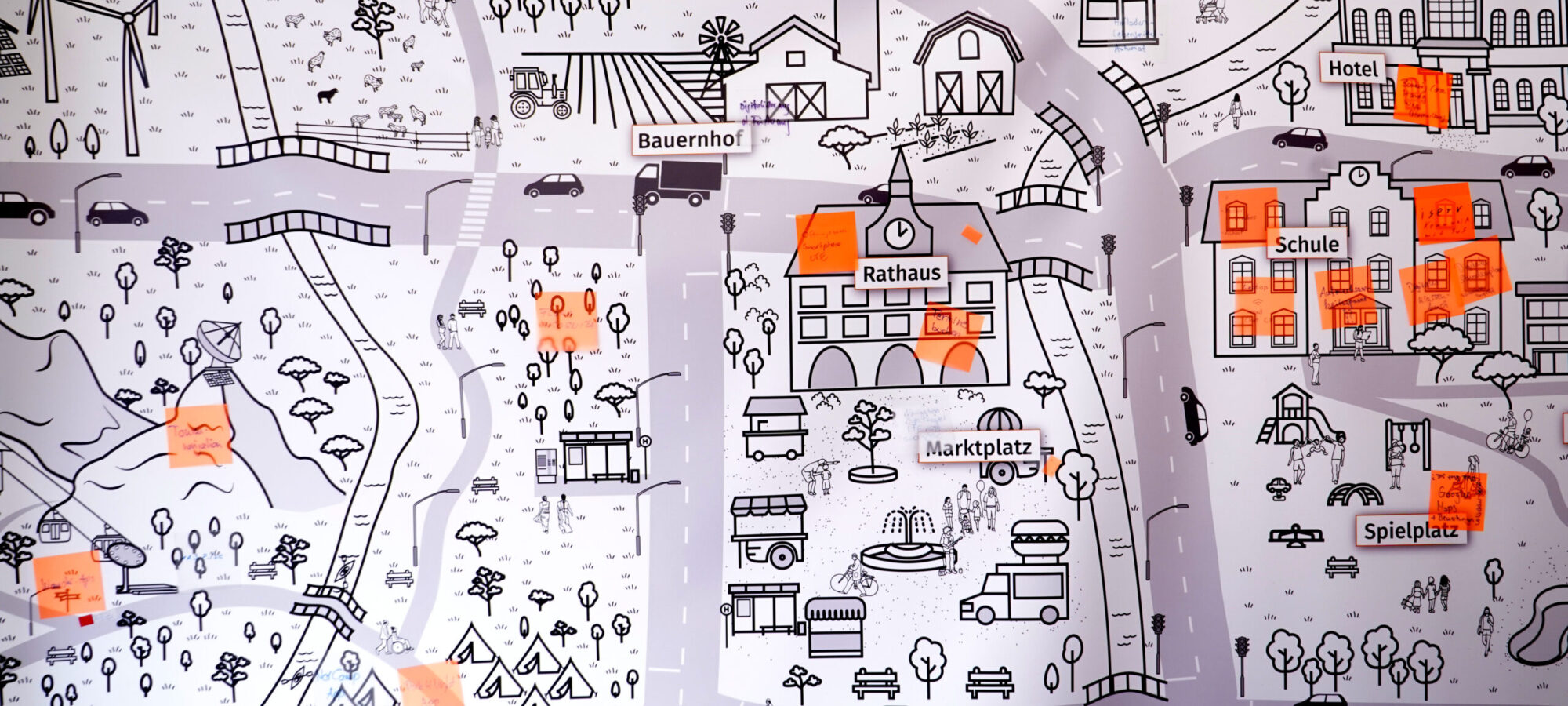News

Hoa Mai Trần was invited as an expert on the topic of digital media in early education to a radio interview with WDR 5. The radio report “Digital media in nurseries: yes or no?” (author Corina Wegler) is about the municipal family centre ‘Krümelkiste’ in Arnsberg-Hüsten in North Rhine-Westphalia, which specialises in the use of digital media. The article highlights opportunities and limitations for early digital education and points to the current relevance of dealing with the realities of children and families in an increasingly digitalised world.
Hoa Mai Trần is a researcher in the CRC project (B05) “(Early) Childhood and Smartphone. Family Interaction Order, Learning Processes and Cooperation” and researches children’s digital gaming practices.
The radio feature is available until 28 May 2025 in the WDR Mediathek. It is only available in German.
Carolin Gerlitz is a full member of the Academy of Sciences and Literature in Mainz
At its last meeting, the Academy of Sciences and Literature in Mainz elected media science Professor Carolin Gerlitz from the University of Siegen as a full member.
Carolin Gerlitz holds the chair of „Digital Media and Methods“ the University of Siegen and is also the spokesperson for our Collaborative Research Center 1187 “Media of Cooperation”. She is principal investigator of the project A03 – Navigation in Online/Offline Spaces. Gerlitz is co-founder of the “Center for Digital Methodologies in Media, Language and Research” and a long-standing member of the Digital Methods Initiative and the Public Data Labs.
Gerlitz studied social and science communication in Berlin (Berlin University of the Arts) and gender, media and culture at Goldsmiths College, University of London, where she completed her Doctorate in Sociology. She then worked in London and Amsterdam before taking up a professorship at the University of Siegen in 2016. Gerlitz focuses on digital media technologies and methods as well as software and platform studies.
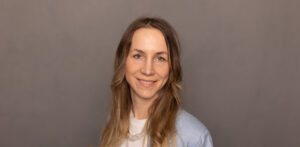
About the Academy of Sciences and Literature
The Academy of Sciences and Literature is a trans-regional association of personalities from the fields of science, literature and music. It serves to cultivate the sciences, literature and music and in this way contributes to the preservation and promotion of cultural heritage. The academy is a place of dialog that focuses on interdisciplinary exchange. The Academy in Mainz currently supervises 37 research projects from all disciplines with a focus on long-term basic research.
The members of the Academy are divided into three classes (Mathematics and Natural Sciences Class, Literature and Music Class, Humanities and Social Sciences Class). Carolin Gerlitz is a member of the humanities and social sciences class.
In the article “The first app: a brief history of the credit card” on ZEVEDI eFin & Demokratie blog, Dr. Sebastian Gießmann traces the development of the credit card as a central medium of consumer society. Starting from its beginnings in the early 20th century as a charge plate, which was particularly widespread in the USA, the transformation of the credit card into a global payment method is described, which embodies both socio-economic prestige and technological innovation.
Sebastian Gießmann shows the developments in media technology and society that have made the credit card an indispensable part of modern capitalism and how the physical credit card has been continuously adapted to the requirements of an increasingly digitalized world – despite and also because of the rapid development of mobile payment services and app-based financial technologies.
➞ Full Article (only available in German)
„Verteilte Zurechenbarkeit. Die Bearbeitung von Störungen im Öffentlichen Verkehr“
Tobias Röhl
Campus, 2022
Tobias Röhl was honored for his habilitation thesis written at the CRC ( project A04) “Verteilte Zurechenbarkeit. Die Bearbeitung von Störungen im Öffentlichen Verkehr” (Campus, 2022) with the Research Prize Ethnography of the Section Sociology of Knowledge of the GSA (German Sociological Association). The award ceremony took place on June 21, 2024 at the 9th Fieldwork Days at TU Dortmund University. The awarded work examines complex disruption management in public transport and explores the question of how accountability is mediated in situations of disruption and is distributed between different actors – from drivers to the administration. Röhl shows that accountability in the event of disruptions cannot be reduced to individuals, but rather arises from the interaction of different actors and technical infrastructures. This “distributed accountability” is the result of a dynamic process in which roles and responsibilities are fluid and constantly renegotiated. The innovative organizational ethnographic study provides valuable insights into the interplay of technology and organization and provides starting points for a well-founded critique of public transport.
Disruptions to public transport are stressful. But where do you complain when the train breaks down? To the staff on site or directly to the company? An ethnographic look at the disruption management of public transport companies shows: Neither strategy is helpful on its own. Drawing on research on accountability and technical infrastructures, the organizational ethnographic study traces how questions of responsibility are technically mediated and shifted back and forth between different actors. This “distributed accountability” cannot be localized in single individuals, but can be found in the interplay of different actors, in the processes and practices of disruption management.
A detailed review of Tobias Röhl’s habilitation thesis „Verteilte Zurechenbarkeit. Die Bearbeitung von Störungen im Öffentlichen Verkehr“ by Hendrik Vollmer was published in 2024 in Soziologische Revue 47 (3): 377-380.
➞ See the review (German only)
About the research prize
In 2024, the Sociology of Knowledge Section of the German Sociological Association awarded the fifth “Ethnography Research Prize” for innovative and outstanding work in the field of ethnographic social research. The prize was endowed with 1,500 euros and awarded during the “Fieldwork Days”, which are usually held every two years. The 9th Fieldwork Days took place for the first time at TU Dortmund University in June 2024.
The “Research Prize Ethnography” is awarded to scientific publications (monographs or essays in German or English) that have been published in the three calendar years preceding the award ceremony. The prizewinner is selected by a jury consisting of five members of the Sociology of Knowledge Section of the German Sociological Association.
➞More about the research prize (German only)
From 2016 to 2020, Tobias Röhl was a researcher in the project A04 – Normal Interruptions of Service. Structure and Change of Public Infrastructures“ at the Collaborative Research Centre 1187 „Media of Cooperation“. Since 2021 he is Professor of Digital Learning and Teaching at the Zurich University of Teacher Education and focuses on the digital transformation of school education. After studying sociology, media studies and linguistics at the University of Konstanz and Trinity College Dublin, he completed his doctorate at the Institute of Sociology at the University of Mainz in 2012 with a thesis on the significance of media and artifacts in the classroom. His habilitation (venia legendi: sociology), accepted at the University of Siegen in 2021, deals with the dynamics of attributability in public transport disruption management. Röhl is currently researching the digital transformation of school education with a particular focus on pedagogical professionalism in the context of artificial intelligence.
The German Sociological Association (GSA) is a non-profit organization whose main objectives are to discuss sociological problems, to promote scientific communication among its members and to contribute to the dissemination and deepening of sociological knowledge. The GSA participates in the clarification of technical and academic issues in sociology and maintains relations with sociology abroad. The GSA is the association of academically qualified sociologists in Germany. It currently has around 3,500 members. Around four-fifths of all sociologists in Germany with a doctorate belong to it. Membership of the association is open to all persons who have proven themselves academically through their studies, research, teaching or publications in the field of sociology.
“En/Countering Tracking: Resisting spatiotemporal media operations in computational culture”
The deadline for submissions is September 15, 2024.
Countering tracking has become a key form of resisting the logics of computational culture. Subversive encounters have emerged in recent years as counterpoints to the hegemonic logics of web infrastructures (Christl and Spiekermann 2016), platform labor (Heiland 2021) and racial capitalism (Russell and De Souza 2023). These attempts to counter tracking take forms that range from investigative visualizations (Fuller and Weizman 2021) or provoking glitches in tracking infrastructures (Leszczynski and Elwood 2022) to uncovering web-based tracking (Sharelab 2015), building counter-infrastructures for labor resistance (Qadri and D’Ignazio 2022), or using sensors and satellite images for critical investigations (Ballinger 2023; Boyd et al. 2018).
Countering tracking becomes a resistant media operation itself, disentangling hegemonic spatiotemporal regimes and their socio-political forces. These forms of countering tracking challenge existing theoretical approaches to the critical analysis of tracking and open up new perspectives on subversion and resistance in computational culture. How is countering tracking by means of tracking possible in different contexts and in relation to software, infrastructures and aesthetics?
We invite critical encounters through and of tracking, enabling new perspectives on computational infrastructures, software, (non-)human aesthetics and operative interactions, by means of theoretical reflections, critical making or activism. We aim at gathering submissions that 1) render existing tracking operations perceivable; 2) disrupt tracking infrastructures; or 3) operationalize tracking itself for resistance. The special issue invites theoretical, conceptual and performative approaches from fields such as media studies, visual studies, artistic research, sociology and critical geography to address the question of how tracking becomes a repressive, subversive or activistic media operation.
Topics and projects might include:
- Inventive methods that repurpose tracking infrastructures, sensors, software and data to research computational culture
- Detailed empirical and critical studies exploring the relations of en/countering tracking in computational culture
- En/countering tracking in labor resistance and platform capitalisms
- Critical theoretical conceptualization of tracking or countering for the study of computational culture
- Critical explorations of the chronopolitics, timescapes and spatiotemporal regimes of tracking
- Activist media, countersurveillance, tactical media, decolonial, (glitch) feminist and resistant epistemologies of tracking
- En/countering relations between political economy, racialized capitalism and tracking
- Visual cultures, (in-)visualities and aesthetics of en/countering tracking
- En/countering tracking in media art and artistic activism
Schedule:
750-word abstracts should be emailed to en_countering_tracking@uni-bonn.de by September 15, 2024. Abstracts will be reviewed by the special issue editors and the Computational Culture editorial board.
Any queries can be addressed to the special issue editors at: en_countering_tracking@uni-bonn.de
Official call for contributions | Call for contributions PDF
“The Datafied Web”:
6th RESAW Conference (5-6 June 2025, Siegen University)
The deadline for submissions is 15 October 2024.
Do you remember the beginnings of early metrics in the 90s, the birth of web counters, those digital pioneers that marked and started to quantify the pulse of online activity, the novelty of seeing website visits measured in real-time, eye-catching graphics becoming the currency of online attention, and the early days of companies like Webtrends, Urchin and DoubleClick?
We invite scholars, researchers, web archivists to contribute to the 6th RESAW conference on the topic of “The Datafied Web”, through a historical lens. We would like to delve into the historical roots, trends, and trajectories that shaped the data-driven paradigm in web development and to examine the genealogies of the datafied and metrified web. Historical studies of trajectories towards a databased web and the emergence of platform-driven mobile ecosystems are very welcome, as well as case studies for instance related to the development of Application Programming Interfaces (APIs) and the evolution of data-sharing practices. Uncovering the early forms of analytics software, their origins, and the role they played in shaping the web landscape, and examining the historical context, aesthetics and role of web counters, analytics tools, mobile sensing and other metrics may also help us deepen our understanding of online interactions, past publics and audiences, and their (uneasy) trajectories. “The datafied web” also raises questions related to methods and (web) archives allowing to research this evolution: what are for instance the challenges and methodologies involved in archiving the metrified and increasingly mobile web, including the back-end infrastructure?
This theme also invites us to trace the historical trajectory of data surveillance and the evolution of data capturing practices on the web. Complementary are issues related to the historical development of tracking mechanisms, cookies, and the creation of digital footprints, as well as the evolution of companies relying on metrics, and the development of financialized web spaces and their implications. By investigating historical controversies and debates surrounding the increasing datafication of the web and uncovering historical instances of innovative data use or resistance practices against the datafication of the web, this conference also aims at reconstructing vivid and key debates that are transversal to the history of the web. How did the datafied web provide for the sensory media environments that we are now living in?
Finally, we wish to discuss innovative research methodologies for uncovering the historical dimensions of the datafied and metrified web, as well as methods that are approaching web archives as data (from an archiving and research perspective) and explore them through distant reading, metadata, seed lists, and other methods. Plus, we want to encourage everyone to think about datafication as a practice of sensing and sense-making that creates, sustains, and undermines media environments.
Theme scope and conference topics of the RESAW Conference
We encourage submissions addressing the conference theme ‘Histories of the Datafied Web’ through the following themes:
Infrastructures
- histories and genealogies of the datafied and metrified web, including its platformization within capitalism(s)
- aesthetics and design of the early metrified web
- the rise of data surveillance and data capture as an industry
- histories of APIs, data-sharing, and advertising technologies
- the rise of web counters, web analytics, and other web metrics
- histories of trackers, cookies, digital footprints, etc.
Publics
- methods and approaches towards audience of the past web
- historical controversies surrounding the datafication and platformization of the web
- histories of uses of data or practices of resistance to datafication and platform economies
- the rise of the financialization of the web, and its political economy
- histories of automation, virality, and popular practices on the web
Archives
- archiving the metrified web and back-end infrastructure of the web
- methodologies for writing histories of the datafied and metrified web
- web archives as data (archiving and documentation, distant reading, use of metadata, seed lists…)
- web archiving data practices and challenges
After the conference, the organizers will invite relevant contributors to participate in a special issue of Internet Histories related to the topic “The Datafied Web”.
Submissions that explore other aspects both within and outside of the general conference theme, are also welcome.
Submissions for the RESAW Conference
The deadline for submissions is 15 October 2024.
Submissions are welcome from all fields and disciplines, and we would particularly encourage postgraduate students and early career researchers to participate. We also encourage contributions that highlight non-Western and non-hegemonic developments. Contributions on practical challenges of web archiving in current moments of crisis are also very welcome.
Possible formats
- Individual papers of 15 minutes (500-word abstract).
- Panel sessions consisting of three individual papers of 15 minutes, introduced by a chair (500-word abstract for each paper, a brief 300-word description of the purpose of the panel).
- Other unconventional proposals like sessions of lightning talks, roundtables, etc., are welcome (300-word abstract).
- A session “My PhD in 5 Minutes” is foreseen (please apply by providing a 300-word abstract).
Acceptance of submissions is based on double-blind peer review.
Possible formats for the pre-conference day
- Submissions related to web archives are welcome from all fields and disciplines, and we would particularly encourage workshops related to tools, hands-on, as well as training sessions and demos.
- A whole pre-conference (500-word abstract)
- Workshops, demos and other formats related to web archives practices, methods, tools, demos (500-word abstract, specifying the expected duration)
Submissions
The deadline for submissions (including the pre-conference day) is 15th October 2024.
To submit a proposal :
https://easychair.org/conferences/?conf=resaw2025
Timetable
- 15 October 2024: Deadline for submissions
- 15 December 2024: Notifications of acceptance
- 25 January 2025: Programme
- March 2025: Registrations open (fees: 90 euros for advanced scholars, 50 euros for PhD students)
- 4 June 2025: Pre-conferences and demos
- 5-6 June 2025: Conference at Siegen University
The RESAW conference is organized by the CRC 1187 Media of Cooperation in collaboration with the RESAW Conference Committee
The conference is funded in part, by Deutsche Forschungsgemeinschaft (DFG) – Projektnummer 262.513.311 – SFB 1187 Medien der Kooperation and in part by the Luxembourg National Research Fund (FNR), [INTER/DFG/23/17960744/DIGMEDIA].
The CRC 1187 offered visitors of all ages exciting insights into the everyday world of digital media and the opportunity to reflect on their own digital everyday life with an interactive stand at the “Open University”, hosted by the University of Siegen on June 8.
(© Astrid Vogelpohl 2024, TP B05)
On Saturday, June 8, 2024, the Schlossplatz of the Lower Castle in Siegen was transformed into a lively research laboratory. As part of the annual “Open University”, more than 50 stands and hands-on exhibits offered insights into various aspects of university life. The DFG Collaborative Research Center 1187 Media of Cooperation also presented a fascinating insight into our digital present. Visitors of all ages explored the CRC stand to share their own experiences with smart devices and learn more about the research investigating our digital and cooperative lives.
The centrepiece of the CRC stand was a 12m long tent wall, which was transformed into a colourful map of our digitalized world over the course of the day. Visitors used sticky notes to mark where and how they use smart devices in their everyday lives on an illustrated map of the city and their homes. From children talking about tablets in kindergarten, to students presenting their favorite apps, to pensioners sharing their experiences with digital assistance applications – the diversity of contributions reflected the ubiquity of digital technologies in our lives. CRC researchers used this opportunity to talk to visitors and gain new perspectives on their work.
The CRC 1187 stand was well received, highlighting the growing public interest in research into our digitalized society. The research centre has been studying digital, data-intensive media since 2016. The researchers are investigating how digital technologies shape our everyday lives and how people shape and use them together. The CRC’s work currently focuses on sensor technologies and artificial intelligence and the question of what influence these have on our daily lives and work. At events such as the “Open University”, the CRC aims to make its research relevant to everyday life in direct exchange with the public and at the same time raise awareness of the importance of digital media in our society.
“Gender and Technology at Work: From Workplace Studies to Social Justice in Design”
Ellen Balka (Simon Fraser University, British Columbia)
Ina Wagner (University of Siegen)
Anne Weibert (University of Siegen)
Volker Wulf (University of Siegen)
The book Gender and Technology at Work: From Workplace Studies to Social Justice in Design was published by Cambridge University Press in April 2024.
The book Gender and Technology at Work: From Workplace Studies to Social Justice in Design, auhtored by our member Volker Wulf (project B04) and his co-authors Ellen Balka, Ina Wagner and Anne Weibert brings together the vast research literature about gender and technology to help designers understand what a gender perspective and a focus on intersectionality can contribute to designing information technology systems and artifacts, and to assist organizations as they work to develop work cultures that are supportive of women and marginalized genders and people. Drawing on empirical and analytical studies of women’s work and technology in many parts of the world, the book addresses how to make invisible aspects of work visible; how to recognize women’s skills without falling into the trap of gender stereotyping; how to engage in improving working conditions; and how to defend care of life situations and needs against a managerial logic.
It addresses challenges for design, including many overlooked and undervalued aspects, such as the complexities involved in human–machine interactions, as well as the need to create safe spaces for research subjects.
- Explores how work in relation to technology is mediated in complex ways by ethnic, cultural, and class backgrounds as well as issues of sexuality
- Presents views about how to build pathways to gender equality in design, addressing wider structural issues that need to be addressed when working towards design justice
- Takes an interdisciplinary approach, including literature from the social sciences, ergonomics, health sciences, computer science, and design disciplines
Reviews & endorsements
“This expansive volume conveys how decades of feminist scholarship on women, work, and technology can inform artifact and system design in ways that promote social justice. It is enriched by the collaboration of a multidisciplinary, multinational team of authors who weave their own stories and those of other feminist technologists into the narrative.”
Carol J. Haddad, Professor Emerita of Technology Studies, Eastern Michigan University
“A captivating deep dive into the intersection of gender, technology, and workplace culture. The authors masterfully integrate extensive research, providing essential guidance for designing user-centric IT systems and promoting inclusive workplaces. A pivotal guide for creating a more equitable tech world.”
Nicola Marsden, Professor of Social Informatics, Heilbronn University, Author of Retaining Women in Tech: Shifting the Paradigm
“This book provides a very welcome and sensitive appraisal of the gender-technology relationship in an ever faster-paced era of change in both domains. It is conceptually comprehensive and politically engaged, restoring authority and agency to those conventionally overlooked and marginalised in technological design processes. A must-read for all those interested in the challenges of achieving social justice in technology design.”
Juliet Webster, Work and Equality Research, London
“Balka, Wagner, Weibert & Wulf’s expertise and established commitment to participatory design (PD) and computer-supported cooperative work (CSCW) provides a rich history of feminist scholarship in gender and technology studies that has shaped this field. Interspersed with interviews from eleven feminist pioneers in PD, CSCW, HCI and STS, they offer provocations, ethical-political perspectives and inspiration for burgeoning intersectional and interdisciplinary research and practice in gender, work and system design, data feminism, critical data studies, and data justice and design justice.”
Leslie Regan Shade, Faculty of Information, University of Toronto
Volker Wulf is Professor at the Institute for Information Systems and New Media at the University of Siegen and is pricipal investigator of the CRC 1187 “Media of Cooperation” project “B04 – Digital Publics and Social Transformation in the Maghreb”. Ellen Balka is a Professor in the School of Communication at Simon Fraser University. Ina Wagner is affiliated to the University of Siegen, Germany after retiring as professor at the Vienna University of Technology, Vienna. Anne Weibert is a research associate at the Institute for Information Systems and New Media at the University of Siegen.
Cambridge University Press is the publishing division of the University of Cambridge, one of the world’s leading research institutions and winner of 81 Nobel Prizes. Cambridge University Press is committed by its charter to disseminate knowledge as widely as possible across the globe. They are publishing academic-level research, reference and higher education textbooks across a wide range of disciplines under the Cambridge University Press imprint.
Power Dynamics and Inequalities within Wikipedia”
Hannah Schmedes (Ruhr University Bochum)
In June 2024, our SFB member Hannah Schmedes (B09) published an article worth reading in the journal FKW // Zeitschrift für Geschlechterforschung und visuelle Kultur 74 (2024) entitled “-1.153 Characters. Towards A Queerfeminist Infrastructural Critique of Wikipedia”, in which she explores the concealed biases, power dynamics, and inequalities within Wikipedia’s infrastructural framework.
Hannah Schmedes is a PhD candidate at the Institute for Media Studies at the Ruhr University Bochum. She is a researcher in the project “B09 – Bicycle Media. Cooperative Media of Mobility” in the DFG-funded CRC 1187 “Media of Cooperation”.
FKW // Zeitschrift für Geschlechterforschung und visuelle Kultur analyzes visual representations and discourses in their social and gender-political significance. FKW thus combines art and cultural theory, image and media studies, gender-specific, political and methodological issues to create a critical cultural history of the visual. Questions about constructions in the field of visual culture, about mechanisms of inclusion and exclusion, symptomatic subject designs and unreflected objectifications are at the forefront of the critical interest in representation. From a perspective that understands knowledge and understanding as dynamic processes that are always changing, FKW sees itself as a platform for constructive debate and discussion that aims to provide food for thought and critically accompany ways of rethinking.
Convergence 30 (1) Special Issue on „Critical Technical Practice(s) in Digital Research“
Daniela van Geenen (University of Siegen)
Karin van Es (University Utrecht)
Jonathan Gray (King’s College London)
Our CRC-Member Daniela van Geenen (A03), together with Karin van Es and Jonathan Gray, edited the special issue “Critical Technical Practice(s) in Digital Research”, which has now been published in Convergence: The International Journal of Research into New Media Technologies 30 (1).
Save the date: the editors will (soft) launch the issue at the CRC research forum on 10 July, 2 to 4 pm CEST with some short presentations. You can join the event either online or in Siegen! Contact Daniela van Geenen.
Links to the articles and the living literature collection (Zotero group) can be found here.
In this special issue, the authors turn to ideas of and approaches to critical technical practices (CTPs) as entry points to doing critique and doing things critically in digitally mediated cultures and societies. They explore the pluralisation of ‘critical technical practice’, starting from its early formulations in the context of AI research and development (Agre, 1997a, 1997b) to the many ways in which it has resonated and been taken up by different publications, projects, groups, and communities of practice, and what it has come to mean. Agre defined CTP as a situational, practical, and constructive way of working: ‘a technical practice for which critical reflection upon the practice is part of the practice itself’ (1997a: XII). Communities of practice in which the notion has been adopted, adapted, and put to use range from human–computer interaction (HCI) to media art and pedagogy, from science and technology studies (STS) and computer-supported cooperative work (CSCW) to digital humanities, media studies and data studies. This special issue serves as an invitation to (re)consider what it means to use this notion drawing on a wider body of work, including beyond Agre. In this introduction, they review and discuss CTPs according to (1) Agre, (2) indexed research, and (3) contributors to this special issue. They conclude with some questions and considerations for those interested in working with this notion.
The issue is at the same time timely and timeless, featuring contributions by Tatjana Seitz (A01) & Sam Hind; Michael Dieter; Jean-Marie John-Mathews, Robin De Mourat, Donato Ricci and Maxime Crépel; Anders Koed Madsen; Winnie Soon and Pablo Velasco; Mathieu Jacomy and Anders Munk; Jessica Ogden, Edward Summers and Shawn Walker; Urszula Pawlicka-Deger; Simon Hirsbrunner, Michael Tebbe and Claudia Müller-Birn; Bernhard Rieder, Eric Borra and Stijn Peters; Carolin Gerlitz (A03 & Speaker of the CRC 1187), Fernando van der Vlist and Jason Chao; Daniel Chavez Heras; and Sabine Niederer and Natalia Sanchez Querubin.
Daniela van Geenen is a lecturer in Data Journalism and Visualization at the University of Applied Sciences Utrecht and is also a Ph.D. candidate at the DFG CRC 1187 “Media of Cooperation” and member of the project “A03 – Navigation in Online/Offline Spaces” at the University of Siegen Karin van Es is associate professor Media & Culture Studies and project lead Humanities at Data School at Utrecht University. Jonathan Gray is Reader in Critical Infrastructure Studies at the Department of Digital Humanities, King’s College London.
Convergence is an international peer-reviewed academic journal which was set up in 1995 to address the creative, social, political and pedagogical issues raised by the advent of new media technologies. As an international research journal, it provides a forum both for monitoring and exploring developments in the field and for encouraging, publishing and promoting vital innovative research. Adopting an inter-disciplinary approach and published six times a year, Convergence has developed this area into an entirely new research field.
6 / 16
